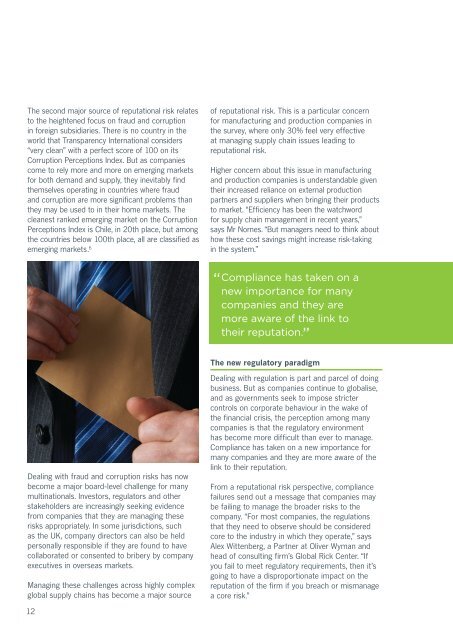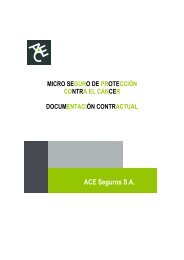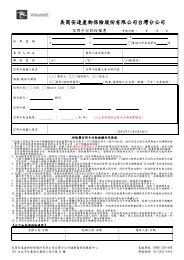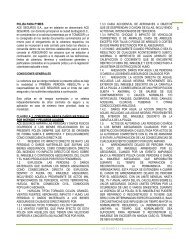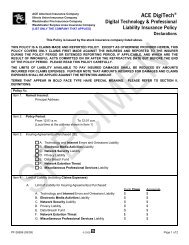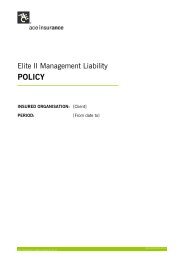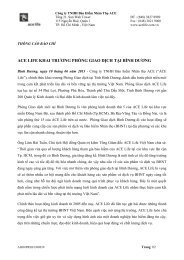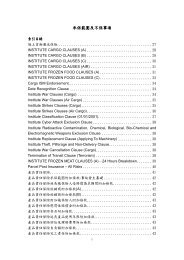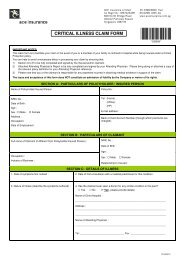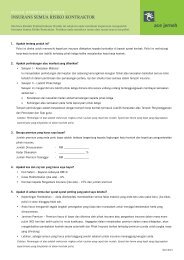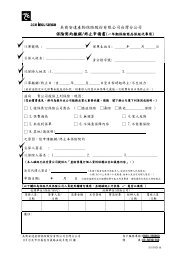REPUTATION AT RIsk - ACE Group
REPUTATION AT RIsk - ACE Group
REPUTATION AT RIsk - ACE Group
Create successful ePaper yourself
Turn your PDF publications into a flip-book with our unique Google optimized e-Paper software.
The second major source of reputational risk relatesto the heightened focus on fraud and corruptionin foreign subsidiaries. There is no country in theworld that Transparency International considers“very clean” with a perfect score of 100 on itsCorruption Perceptions Index. But as companiescome to rely more and more on emerging marketsfor both demand and supply, they inevitably findthemselves operating in countries where fraudand corruption are more significant problems thanthey may be used to in their home markets. Thecleanest ranked emerging market on the CorruptionPerceptions Index is Chile, in 20th place, but amongthe countries below 100th place, all are classified asemerging markets. 6of reputational risk. This is a particular concernfor manufacturing and production companies inthe survey, where only 30% feel very effectiveat managing supply chain issues leading toreputational risk.Higher concern about this issue in manufacturingand production companies is understandable giventheir increased reliance on external productionpartners and suppliers when bringing their productsto market. “Efficiency has been the watchwordfor supply chain management in recent years,”says Mr Nornes. “But managers need to think abouthow these cost savings might increase risk-takingin the system.”“ Compliance has taken on anew importance for manycompanies and they aremore aware of the link totheir reputation.”The new regulatory paradigmDealing with fraud and corruption risks has nowbecome a major board-level challenge for manymultinationals. Investors, regulators and otherstakeholders are increasingly seeking evidencefrom companies that they are managing theserisks appropriately. In some jurisdictions, suchas the UK, company directors can also be heldpersonally responsible if they are found to havecollaborated or consented to bribery by companyexecutives in overseas markets.Managing these challenges across highly complexglobal supply chains has become a major sourceDealing with regulation is part and parcel of doingbusiness. But as companies continue to globalise,and as governments seek to impose strictercontrols on corporate behaviour in the wake ofthe financial crisis, the perception among manycompanies is that the regulatory environmenthas become more difficult than ever to manage.Compliance has taken on a new importance formany companies and they are more aware of thelink to their reputation.From a reputational risk perspective, compliancefailures send out a message that companies maybe failing to manage the broader risks to thecompany. “For most companies, the regulationsthat they need to observe should be consideredcore to the industry in which they operate,” saysAlex Wittenberg, a Partner at Oliver Wyman andhead of consulting firm’s Global Rick Center. “Ifyou fail to meet regulatory requirements, then it’sgoing to have a disproportionate impact on thereputation of the firm if you breach or mismanagea core risk.”12


